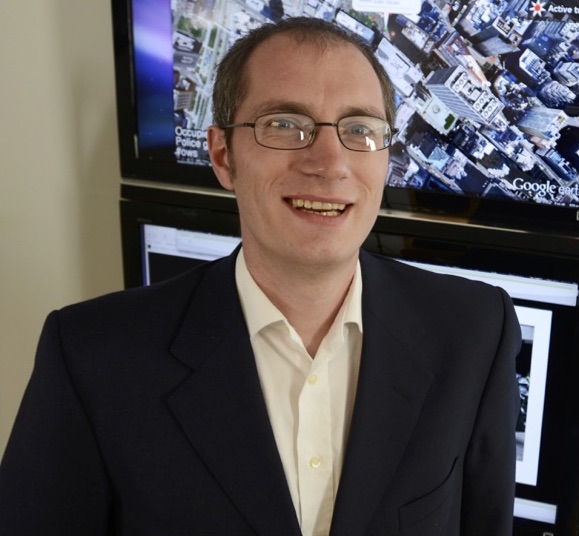Dr. Andrew Crooks is an associate professor with a joint appointment in the Department of Computational Data Science and the Department of Geography and GeoInformation Science, as well as a researcher in the Center for Social Complexity at George Mason University. He teaches a variety of courses in relation to computational social science, urban systems, GIS and agent-based modeling. His research interests relate to exploring, understanding and the communication of the physical and socio-economic environments using GIS, spatial analysis, geovisualization, agent-based modeling and social network analysis methodologies.
Dr. Crooks received his BSc (hons) in Geology and Physical Geography and an MSc in Geographical Information Science from the University of Edinburgh and his PhD from the Centre for Advanced Spatial Analysis (CASA), University College London. Before joining George Mason University, he held the position of GLA Economics Research Fellow in Urban Systems at CASA where he continued to develop geographical explicit agent-based models along with exploring and developing various other GIS applications and models focused around London.
His research interests have resulted in numerous publications.
Contact Information
Office: 379 Research Hall,MS 6B2
Telephone: (703) 993-4640
Fax: (703) 993-9290
Email: [email protected]
Dr. William G. Kennedy is an Associate Professor at George Mason University. Before coming to Mason in 2008, he had completed full careers in the Navy (30 years in the Submarine Service and the Naval Reserves) and with the federal government (Nuclear Regulatory Commission (10 yrs) and then Department of Energy (15 yrs)). He earned a Ph.D. in Information Technology in 2003 (Artificial Intelligence) and retired from federal civil service two years later. A 3 year post-doc at the Naval Research Laboratory in cognitive robotics changed his research interests toward Cognitive Science. His research is now in modeling cognitive processes, such as learning and trust, and modeling human behavior in agent-based models of groups and societies. His research home is the Center for Social Complexity in the Krasnow Institute for Advanced Study, but he is also also affilated with the College of Science’s Department of Computational and Data Science and teaches for both the Computational Social Science program and the Department of Psychology.
Dr. Kennedy’s current projects include a contract from the Logistics Management Institute (LMI) for a NASA project to research new language and visualization methods that will create a coherent and shared framework for the specification, design, development, management, and use of what are to a large degree unregulated autonomous systems. In a second project, funded by DTRA, Dr. Kennedy and his team are working to advance understanding of the behavioral and social effects of a nuclear weapon of mass destruction (WMD) event on a large-city population. The goal is to anticipate early response to the disaster in order to suggest ways to mitigate the damage, such as more effectively maximizing emergency responder resources and behaviors or designing disaster response educational programs.
Recent publications include: Lee, M., Sankar, V.R., Hammer, A., Kennedy, W.G., Barb, J.J., McQueen, P.G., and Leggio, L. (2019 in press) Using Machine Learning to Classify Individuals with Alcohol Use Disorder based on Treatment Seeking Status. The Lancet. Orr, M.G., Lebiere, C., Stocco, A., Pirolli, P., Pires, B., Kennedy, W.G. (2019) Multi-scale resolution of neural, cognitive and social systems. Journal of Computational and Mathematical Organization Theory 25(1), pp 4-23. Springer. For more publications,click here
Contact Information
Office: Research 371
Telephone: 703-993-9291
E-mail: [email protected]
Dr. Sean Luke is professor of computer science at the Volgenau School of Engineering. His major research area in the field of artificial intelligence has cultivated new methods for developing evolutionary computation (computer learning). As a director of the Evolutionary Computation Lab (ECLab) at the Volgenau School of Engineering at George Mason University, his research involves the design and application of computational models of Darwinian-like models of evolution. Such models can be used to better understand existing evolutionary systems (such as bacterial resistance to penicillin) or can be used to make computer systems more robust, flexible and adaptive (such as a stock market trading program). In this lab, Luke examines information exchange relationships in the natural world for application opportunities in computer science. Additionally, as associate director at the George Mason Krasnow Institute’s Center for Social Complexity, Luke’s research and collaboration isolates new theories about human social interaction for use in multi-agent networks and computer reasoning. He has acted as PI on several grants, the most recent of which was funded by NSF and covered Online Training of Hierarchical Multirobot Teams.
Dr. Luke earned his BS in Computer Science at Brigham Young University and his PhD D in Computer Science (Artificial Intelligence) at University of Maryland.
For publications,click here.
Contact Information
Office: 4451 Engineering Building
Telephone: 703–993–4169
Fax: 703–993–1710
E-mail: [email protected]



